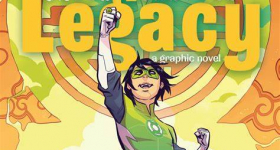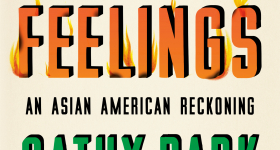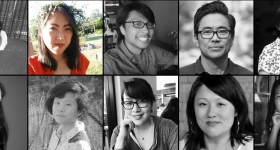Elaine Chiew’s debut short story collection, The Heartsick Diaspora, lives up to its title. The stories primarily take place in three cities with large Asian populations: New York, London and Singapore. They star ghosts, tiger moms, sous chefs and even a writing group of “ethnic writers” (a term she uses tongue-in-cheek). The Heartsick Diaspora is an ambitious attempt to capture the breadth of the Singaporean and Malaysian Chinese diaspora through time and in three of the cities (among others) in which Chiew has lived. Chiew’s prose is intelligent and funny and reveals a range rarely seen in story collections.
Aside from her recent publication, she edited and contributed to Cooked Up: Food Fiction From Around the World (New Internationalist, 2015). She contributed to One World: A Global Anthology of Short Stories (New Internationalist, 2009), adopted on scores of modern literature courses. She is a two-time winner of the Bridport Short Story Competition and recently shortlisted for the Manchester Fiction Prize. Her stories have appeared in numerous anthologies in the United Kingdom, United States and Singapore. Originally from Malaysia, she graduated from Stanford Law School and worked as a lawyer in New York and Hong Kong before moving to the UK to study at Goldsmiths, University of London. She lives in Singapore. I had a chance to catch up with her over email just before her book launch.
Leland Cheuk: I love a good ol’ ghost story, of which there are a few in the collection, but my favorite stories of yours are the ones in contemporary milieus like the fine dining kitchen or the mind of a mom who is super into hip-hop. There’s rap and food throughout the collection, and in “Chronicles of a Culinary Poseur,” there’s both. Can you tell me a little bit about what inspired the story? Did you spend time working in a fine dining kitchen?
Elaine Chiew: It’s fun to hear what stories appealed to a reader and why, so thank you! I did spend a week working in an Italian fine dining kitchen in New York City while researching a novel about haute cuisine and hip-hop (buried now in novel boneyard). I was intrigued by the class divide I saw from the kitchen peephole. Outside, the diners come to dine in their finery and spend easily upwards of hundreds of dollars per meal; inside the kitchen, the line cooks earn little more than minimum wage, and it is usually staffed by ethnic minorities, and yes, hip-hop music blares in the kitchen. Peepholes and doorways figure in several of the stories in the collection, for a reason — they often act as boundaries, keeping out (excluding) as well as keeping in (maintaining, protecting), but so flimsy and so porous. As a fellow writer, don’t you often feel that we as writers exist as translators or conduits or doormen? We stand at these liminal thresholds where we present contrasts by juxtaposing them. As service to story. Not to judge, but often as facilitator, “Look, look at, look through; perceive.”
LC: You’re so right. I think that’s what separates the beginning writer from the experienced and published one — when the writer as a person becomes less visible in the prose.
The references are so on-point in that story, from Jay-Z to James Clavell’s Tai-Pan to that pretentious, appropriating head chef. It’s really a story about cultural appropriation. Do you think it’s possible for these fine dining restaurants to appropriate with respect?
EC: This is an interesting interpretation — although my message is possibly softer — we are all appropriating, we’ve been appropriating since civilization began. Centuries ago, the famed Middle Kingdom actively encouraged appropriation of its language as cultural influence and dominion. Here’s Marlon James’ take on cultural appropriation in his Prologue at the Singapore Writers’ Festival: “Appropriation is the least offensive part.” As political tides change, when is it borrowing, and when is it cultural imperialism or theft? We cannot begin to approach this question until we are willing to examine the dynamics and flows of power. I don’t think we own culture (segments of it don’t exist as some giant intellectual property pie in the sky to which only members of certain communities may siphon pieces of), its very nature is social and it exists to be shared. A lot of times, what we are really asking is who gets to monetize what part of any given culture? From another perspective, writers who feel freedom is being curbed often rail about it after they have exercised such freedom; what they are asking for isn’t freedom to express but freedom from critique.
My intention was to flush out that feeling of fraud that attends a mindset that constantly perceives itself in two mind frames: the inner eye and the eye that looks at how society measures it (cf. W.E.B. Dubois) and what kind of impact this has on the psyche (cf. Fanon). In "Chronicles of a Culinary Poseur," who is appropriating whom, as you rightly point out, begins to become an absurdist prism, and the salt-based menu carries this absurd register as well. Has the history of salt also been appropriated? Where then does one begin to locate the sense of one’s self amidst fragmentation and dilution of surface markers of identity?
One astute reader said to me, “You let the white guy win.” Did I? Do you think so? Who is telling the story? Never underestimate the person holding the bullhorn.
LC: I thought you let the white guy win as well, and it was a powerful statement on power dynamics in that kitchen.
I have to ask about “The Heartsick Diaspora,” the very funny title story in the collection. Set in London, it deals with a writing group in which all of the writers are Asian and is doomed to make a constant calculation of how to represent everything from ethnic food to Eastern mythology for Western audiences. In trying to avoid all the clichés, they end up inventing new ones. What do you think is the ideal state for FOMO (Fiction of Minority Origin) writers and do you think we’ll one day get to a place where we don’t have to perform our ethnicity?
EC: Actually, I think we are all performing our ethnicities, but I think as minorities, we sometimes perform scripts written for or dictated to or that we think are expected of us — our hidden transcripts are revealed only to other minorities who “get” us without us having to explain or justify. Ironically, I catch myself wondering if the moment we get to perform those hidden transcripts, their delicious subversive power diminishes, which perhaps is what you are alluding to; new clichés then form and take hold. Perhaps, strangely, what you are asking me is really what’s true and authentic and what’s performative and staged? I don’t know the answer to that, but I do think that literary fiction has to begin to grapple with the access we now each have to an individual stage, instant, uploadable within seconds. In our need to be visible at all times, all sorts of hidden transcripts are converted into seemingly authentic narratives, as stories we play in front of an audience. Where then do our hidden inner lives take place? Have we completely given up on invisibility as subversive power? How are we complicit in the disintegration of our own inner, hidden transcripts?
LC: I’m not so convinced we’ve given up on our offline lives. I feel like more and more young people are getting off social media, similar to the way music lovers brought the LP back in style. I’m strangely optimistic about the enduring mystery of the individual.
Okay, another I-have-to-ask. “Rap of the Tiger Mother” stars a mother with a collegiate past as a rap enthusiast. What inspired this story? I know you have a hip-hop novel in a drawer somewhere, so feel free to comment on that.
EC: Battle Hymn of the Tiger Mother — remember that? When it came out, Amy Chua was excoriated; although intended as a confessional, it was taken to be a manifesto.
My story “Rap of the Tiger Mother” was a tongue-in-cheek, slightly absurdist reference to Amy Chua’s book while at the same time exploring this phenomenon in terms of how tiger mother parenting conflates race and class. By which I mean: while race relations played a part in tiger mothers’ interactions with each other in a playgroup setting, I believe Amy Chua’s book hit a particular nerve in a contemporary moment about how any of us are parenting, and why we are parenting this way. Do we need to think more deeply about how we respond to competitive pressures within high-income urban areas for education and economic advancement? Are we prepared for the distance we are deliberately adding to our goal of happiness when winning or losing is tied so closely to status symbols — what university, what job, what income, what lifestyle, what property values? These were some of the questions I wanted to explore.
LC: Mom gossip can be savage. I’m so impressed by the range of these stories. The book really does cover the global pan-Asian diaspora, ranging from Southeast Asia to the West and places in between. What are some takeaways that you’ve gleaned from your experience living in so many places as an Asian in the big world?
EC: It’s really gratifying to hear that you see the collection as wide-ranging, with hopefully disparate voices, in that sense I don’t feel there has been a failure in my exercise of empathy. At the same time, I would also say it reflects the subjective experience of a walleyed Chinese woman (without my contacts, that’s how I would look) whose brain is occupied about 35% of the time with thoughts of food (to the extent I even made up two menus for the collection — one in “The Coffin Maker” and the other in “Culinary Poseur”), wears perpetual sunglasses on my head (to protect the important neurons), long-jumps like a cricket, thinks Chinese proverbs are like a motherlode of humor, fortune cookies are hilarious misrepresentations of Chinese culture, Eastern mythology will get its day in the sun and finds obscure history quite interesting. I suppose if there is one takeaway, it’s this: beware of bad karma — it’s like a T-Rex; it just keeps chasing you. Also, there is no representative Asian. Me, I’m one Asian among many Asians; rebellious, slightly subversive Asian; tongue-in-cheek, displaced Asian; or not-so-good but not-so-bad lah Asian.
LC: Thanks for title-checking my novel. You didn’t have to.
Okay, flash round. Biggie or 2Pac?
EC: 2Pac definitely.
LC: Kanye or Jay-Z?
EC: Jay-Z for lyrics, Kanye for performing (he’s pretty incendiary on stage).
LC: Jay-Z or Drake?
EC: Jay-Z. Drake? Oh please.
LC: Kendrick or Run the Jewels?
EC: Kendrick. Power poison pain and joy in my DNA.
LC: Chance the Rapper or Childish Gambino?
EC: Neither. Nowadays checking out Chinese rap. Haha, I quite like MC Hotdog!










Comments